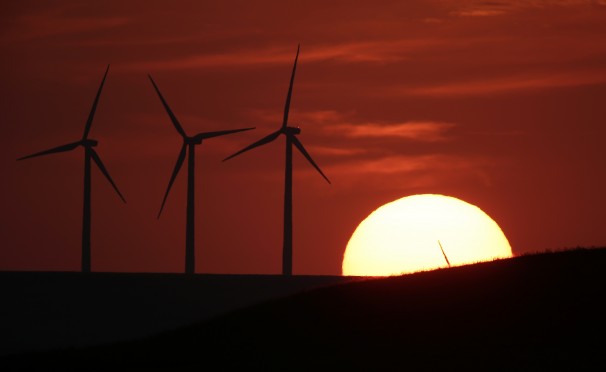A battle is looming over renewable energy, and fossil fuel interests are losing

In state capitals across the country, legislators are debating proposals to roll back environmental rules, prodded by industry and advocacy groups eager to curtail regulations aimed at curbing greenhouse gases.
The measures, which have been introduced in about 18 states, lie at the heart of an effort to expand to the state level the battle over fossil fuel and renewable energy. The new rules would trim or abolish climate mandates — including those that require utilities to use solar and wind energy, as well as proposed Environmental Protection Agency rules that would reduce carbon emissions from power plants.
But the campaign — despite its backing from powerful groups such as Americans for Prosperity — has run into a surprising roadblock: the growing political clout of renewable-energy interests, even in rock-ribbed Republican states such as Kansas.
The stage has been set for what one lobbyist called “trench warfare” as moneyed interests on both sides wrestle over some of the strongest regulations for promoting renewable energy. And the issues are likely to surface this fall in the midterm elections, as well, with California billionaire Tom Steyer pouring money into various gubernatorial and state and federal legislative races to back candidates who support tough rules curbing pollution.
The multi-pronged conservative effort to roll back regulations, begun more than a year ago, is supported by a loose, well-funded confederation that includes the U.S. Chamber of Commerce, the National Association of Manufacturers and conservative activist groups such as Americans for Prosperity, a politically active nonprofit organization founded in part by brothers David and Charles Koch. These groups argue that existing government rules violate free-market principles and will ultimately drive up costs for consumers.
The proposed measures are similar from state to state. In some cases, the legislative language matches or closely resembles model bills and resolutions offered by the American Legislative Exchange Council (ALEC), a free-market-oriented group of state lawmakers underwritten in part by Exxon Mobil, Koch Industries, Duke Energy and Peabody Energy.
“Now more than ever is the time for states to lead the way,” ALEC’s top officials told its members at a meeting in December.
The coalition campaigns have achieved only symbolic victories in a few states. Nonbinding resolutions critical of the EPA power plant proposals have been approved in Alabama, Georgia, Nebraska, West Virginia and Wyoming. Three other states — Louisiana, Missouri and Ohio — are weighing legislation similar to the ALEC model.
Only one of the 18state legislatures has approved a more substantive measure that would preempt the EPA’s power plant rules. And even that bill, in Kentucky, could backfire by giving up a chance for the state to design its own program and forcing it to accept a federal compliance program.
“Clean energy is beginning to become mainstream,” said Gabe Elsner, executive director of the Energy and Policy Institute, a clean-energy think tank in Washington. “Renewable energy is popular and has increased political power now,” but, he added, “that power is still eclipsed by the resources of the fossil fuel industry.”
Collected:
http://www.washingtonpost.com/

